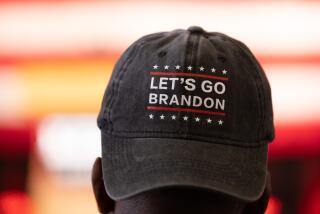2008’s ‘Bradley effect’
- Share via
If I had a nickel for every time some pundit has opined about Barack Obama and the dreaded “Bradley effect,” I could rescue Wall Street.
How many of those yakkers really know about the Bradley effect 1.0, the original, back in 1982, when Tom Bradley, the black mayor of Los Angeles -- whom polls put ahead of his rival for California governor right up to voting day -- lost by barely 52,000 votes out of 7.5 million cast?
The Bradley effect has come to mean this: Voters lie to pollsters about black candidates, and enough of them lie to create a huge gap between poll results and election results. The Bradley effect asserts that when Americans finally get into the voting booth and see the black candidate’s name on the ballot, they flinch.
But is that really all that happened in 1982?
Bradley was a UCLA graduate, a former cop and City Council member, and he regarded himself not as a black politician but as a politician who happened to be black. Philip Depoian worked with Bradley for about three decades, and he told me that Bradley’s “was probably the most integrated mind-set I’ve ever come across -- he never looked at anybody from an ethnic point of view.” When a student visiting City Hall in 1979 asked the mayor whether L.A. voters had gotten “a black Gerald Ford rather than a black John Kennedy,” Bradley replied, “I’m not a black this or a black that. I’m just Tom Bradley.”
He’d been mayor for nine years when he ran for governor, blowing away the competition in the Democratic primary and cruising toward becoming the nation’s first elected black governor. Six weeks before the election, Bradley was 14 points ahead. Three weeks before the election, his opponent’s campaign manager declared that a hidden anti-black vote could make a difference of five points: “It’s just a fact of life. If people are going to vote that way, they are certainly not going to announce it for a survey taker.” A week later, Bradley’s lead had dropped to seven points.
Below Bradley’s name on the California ballot was Proposition 15, requiring the registering of handguns. On election day, Proposition 15 flushed out voters in rural precincts, places where politicians didn’t campaign and pollsters didn’t poll. And as long as they were in the booth, why not also vote against that black big-city mayor who was just the kind of liberal who’d love to take their guns away?
But it wasn’t guns alone that sank Bradley; two white Democrats also running for statewide office won by double digits.
I’m inclined to think the Bradley effect was born earlier, during Bradley’s 1969 run for mayor. Incumbent Sam Yorty’s race-baiting campaign accused the ex-LAPD lieutenant of being the puppet of “black militants and white radicals.” Three days before the election, The Times’ poll had Bradley 15 points ahead. On election day, he lost 45% to Yorty’s 55%.
Has anything changed for the election that’s about to test the Bradley effect 2.0?
Bradley, the grandson of slaves, barely acknowledged race in his political life. The half-white Obama, with his quips about not looking “like all those other presidents on the dollar bills,” has confronted race forthrightly and tried to put it behind him, and us.
Also, in 1982, Depoian said, voters would look at Bradley and tell themselves, “ ‘I didn’t like the color of his tie that day on the TV news.’ Whatever in their hearts they could justify for not voting for a black man, they found.”
Today, people tell pollsters outright that they won’t vote for a black candidate. In Pennsylvania’s Democratic primary, one voter in six said race influenced his vote. The blogs are awash in racist bile, not all of it anonymous. An Associated Press-Yahoo poll found that 40% of white Americans have some negative attitudes toward blacks. The AP story quoted John Clouse in an Ohio coffee shop with his friends, saying flat out, “We still don’t like black people.”
This is progress? Sure, at least to Depoian. “When someone admits, ‘I can’t vote for him because he’s not of my ethnic group,’ that’s progress, because [candidates] know how to handle it,” he said. “And more important, they know how to poll for it.”
Are we better off with this devil we know rather than a devil we don’t?
I called up Charles Henry, who teaches African American studies at UC Berkeley. In 1983, he was the first to measure the Bradley effect. Yes, perceptions of race are changing, but still, for Obama now, as for Tom Bradley then, Henry calculates that it will take “a double-digit lead to feel confident come election day.”
It grieves me to say so, but he may be right. Good polls don’t change bad attitudes. If America 2008 hasn’t changed much from California 1982, by next year pundits will be calling it the “Obama effect.”
--
More to Read
Get the L.A. Times Politics newsletter
Deeply reported insights into legislation, politics and policy from Sacramento, Washington and beyond. In your inbox twice per week.
You may occasionally receive promotional content from the Los Angeles Times.











